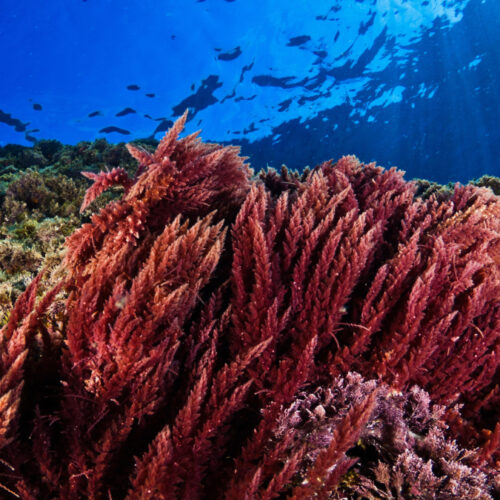
- Reference # A.3.2021051
- Project Status Current
- Timeframe 2 years (2021 to 2023)
- Project manager Sarah Docherty
- CRCNA Funding $450,000
- Total project value $2,096,237
- Project research participant University of Western Australia ; Pilbara Blue Carbon ; Immersion Group ; Abrolhos Aquaculture Australia ; Curtin University ; Rangelands NRM ; Future Green Solutions ; Australian Producers Consortium ; Darryl Corps Family Trust T/A Karratha Earth Moving and Sand Supplies
- Research Programs 2. New and developing industries in Northern Australia
- Location Karratha, Shark Bay, Abrolhos Islands, Perth
- Aquaculture
- Agriculture
- Beef
Summary
It has been proven that the addition of a small quantity of the bromoform-producing red seaweed (Asparagopsis taxiformis) supplement to livestock feed can reduce methane emissions up to 98% and enhance feed conversion efficiency, and productivity by 20% (Abbott 2020; CSIRO 2020; Vijn 2020; Roque 2019).
This novel approach to methane reduction and production has a projected demand for red seaweed from domestic feedlots of 300,000 tonnes of dried Asparagopsis annually with potential for international trade in the millions of tonnes as international governments seize upon climate initiatives.
This project will address the key knowledge blocks to unlock the industry’s potential for Northern Australia in the following ways:
- Research and develop a unique technical capability to generate commercial quantities of propagation units
- Promote settlement and growth of propagation units on cultivation substrate
- Test prototype cultivation systems and on-farm production in compatible locations
- Monitor, manage and optimise consistency of bromoform, the active anti-methane metabolite throughout the production pathway
- Develop commercialisation pathways within regional clusters across northern Western Australia.
Expected outcomes
The project consortium has identified that Asparagopsis production is essential to expanding seaweed aquaculture in Northern Australia, and to underpin supplementary feeding of cattle to lower greenhouse gas emissions and move Australia’s beef and dairy industry towards carbon neutrality by 2030 (CN30).
It is expected this project will deliver:
- Best-practice cultivation of Asparagopsis for Northern Australia to assist and support the industry to overcome R&D impediments.
- A pathway for increased investment by building capability in commercial-scale propagation and production processes for adoption by the industry.
- A pathway to commercialisation through the supply chain that exists within our consortium and industry partners.
- New jobs for Northern Australia across the Asparagopsis supply chain with potential to create new Indigenous employment on-country as key production hotspots are within Indigenous-owned land and waters.

